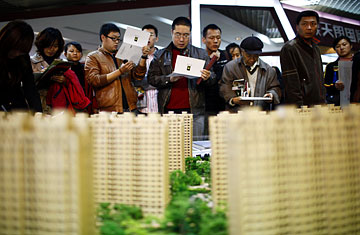
Chinese visitors look at model apartment buildings at a real estate fair in Changchun, northeast of Jilin province, on Oct. 16, 2009
The Chinese economy expanded 8.7% last year, the National Bureau of Statistics announced on Thursday, an impressive figure that will offer some relief to Beijing policymakers who declared that maintaining stable growth was critical to ensuring social stability in the face of the global economic downturn. Thanks to expansive stimulus spending and a flood of cheap credit, the Chinese government was able to ensure growth, giving it clout at home and abroad as other major world economies still grapple with slow recoveries. "Those measures quickly produced results and stopped the remarkable decline in our economic growth, and China thus became the first to, on the whole, achieve recovery and stabilization in its economy," said Ma Jiantang, director of the National Bureau of Statistics.
His words will be little comfort to Chen Li. Like millions of other Chinese, the Beijing-based Web developer is struggling with one of the side effects of the country's stimulus efforts — a runaway property market. Fueled by cheap credit, property prices have grown steadily since mid-2009. A government survey of 70 medium- and large-size cities found that in December, average housing costs jumped 2.1% over the previous month — the fastest increase in 18 months.
For many urban middle-class Chinese, dreams of owning property that came into focus in the past decade have faded. Chen, 28, makes about $22,000 a year. By combining that with his wife's $13,000 salary as an office administrator, the couple estimated that they could afford a $260,000 apartment. But after more than a year of searching, and touring some 50 potential homes, they're still renting. In the heated market, sellers kept raising the price thousands of dollars just as Chen and his wife were on the verge of closing a deal, he says. Or worse, apartments listed at affordable prices were often sold within minutes at sums beyond Chen's comprehension. "In the end, we had no choice but to give up," he says. "Eventually we will still need a home that belongs to us, especially if we have a child. I just hope the government will do something to bring down the prices this year."
Home sales last year increased in value 80% over 2008, according to the National Bureau of Statistics. That pace has slowed in recent weeks as buyers like Chen are now looking for government intervention. In late December, Premier Wen Jiabao promised action to help keep housing prices in check. "As the property market is recovering rapidly this year, housing prices in some cities are rising too fast, which deserves the great attention of the central government," he told Xinhua, the state-run news service. During Thursday's press conference announcing the 2009 GDP numbers, Ma too acknowledged that "the price of real estate in some cities is growing too fast."
To curb property speculation, Beijing has reintroduced a sales tax on residences resold within five years of their purchase. Earlier this month the State Council introduced a rule that requires a 40% down payment on the purchase of a second home, and on Jan. 12, China's central bank raised the reserve requirement for commercial lenders in an effort to control the torrid growth of credit after the value of new loans more than doubled last year.
Some property developers and economists have called China's housing market a bubble. Whether the government can gently deflate it is an open question. Beijing's past efforts to control housing prices have been unsuccessful, says Shanghai-based economist Andy Xie. One flaw is that local governments rely on land sales for about one-third of their revenue, which gives them an incentive to keep prices high. "Somehow, the market keeps going up," Xie says. "People think the government is not sincere about tightening. How would the biggest beneficiary let the price fall?"
And property markets are a growing piece of the Chinese economy. The total value of property sales in 2009 — $644 billion — equals one-eighth of the total GDP for the year. That growing reliance is not only hard to cut back on, but it creates a further risk, adds Xie. "The Chinese economy is so dependent on property, but property is not a productive asset. It doesn't have a long-term benefit for the country's economic production."
As China heads into 2010, its economic policymakers will have to juggle how to control the property market for consumers like Chen without debilitating it or harming the overall economic recovery. "While the authorities aim to contain property-price increases, they are highly mindful of the importance of stability in the sector, as it bears upon consumption and employment," Jing Ulrich, managing director of China equities for JPMorgan, wrote in a research note. It's a tricky balancing act. But it's a task the other countries still struggling to emerge from the global downturn would envy.
— With reporting by Jessie Jiang / Beijing
